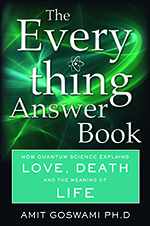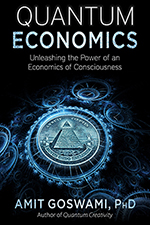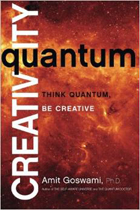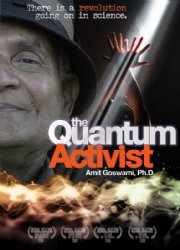The Creative Exploration of Love
By Amit Goswami, Ph. D.
There are many approaches for the creative exploration of the archetype of love. Love between parents and children, love between two friends, even love towards oneself, all can be the subject of creative exploration. But as the great spiritual teacher of India Sri Chaitanya said, “Love between a man and a woman is sweet.” So this is the type of love I will choose for illustration.
In current Western culture, creative exploration of love is not easy. According to scientific materialism, which dominates this culture’s thinking, love is sex. The Beetles sang, “All we need is love.” It touched a chord in us. But we interpreted love as sex, and we had a culture of free sex (though called free love, of course) for a while. But that got us nowhere in a hurry.
In quantum psychology, we recognize from the get-go that love is an archetype. There is only one-way to explore an archetype. You need to be creative. How do you begin?
The good news is: You’ve already begun if you are an adult and have had sex. Sex is not love, but sex is a powerful opener of love, a doorway if you will. And there is a choice here: You can participate in casual sex, or you can choose to pursue sex only when you have established a heart connection. If you go on choosing the former, you are reinforcing your navel chakra, body ego. Yet, suppose you wait to find a partner who makes your heart sing? And suppose that somehow you even begin to like this partner during the phase of romantic love, which even after the neurochemicals run out, you wonder, is there a way I can rekindle the juices? You are ready for the exploration of what the literature calls unconditional love.
As your study of the creative process in my previous blogs shows, creativity needs perseverance; sometimes a long practice of do-be-do-be-do, alternative focused doing and relaxed being. At this point, you make a commitment to explore love with this particular partner. Gives a new meaning to marriage, doesn’t it? (When we ensure the legality of gay marriage, we will finally be removing the obstacles preventing a significant minority of Americans to creatively explore the archetype of love, no less. Shouldn’t religions be delighted with this scientific interpretation of the event?)
You had your intuition that this is the partner to explore love with, and now with marriage you have a committed relationship, a partner willing to creatively explore love with you. Open up; explore your gender differences. If you are the male, confess your inability to open your heart; confess you really don’t know your heart at all except for a few episodes with romantic love partners. Likewise, if you are female, discuss your problems with your navel chakra experiences of self-respect, self-worth, and self-love.
At this point it helps to go to a tai chi master to ask for help. He or she may be able to guide you in how to develop sensitivity in both the navel and the heart chakras as needed. If your navel is strong, there is a tai chi practice that enables you to raise the energy from the navel to the heart where you need it. Similarly, there is a practice to shift energy from a strong heart to the weak navel.
Learn to focus. Practice concentration meditation fifteen minutes a day with a mantra, a one-syllable word (love is good). Repeat the mantra in your mind over and over. When you find you have been distracted, bring your mind back firmly to repeating the mantra.
Slow down. Practice awareness meditation: just be aware of your internal landscape naturally; let thought and emotions appear as passing clouds; don’t hold on to any particular one. Fifteen minutes daily, does that sound difficult to fit in into your busy schedule?
Slow down in your sex sessions, not only slow hands, but slow everything. Ever heard of tantric sex? Temporarily suspend the focus on orgasm. Slow sex. If you are male and lose your erection, so what? Experience the closeness as your heart opens. Isn’t vulnerability wonderful?
All this is preparation. Slowing down is good preparation for the next stage we might call unconscious processing. The gap between thoughts, the gap between feelings has increased for you both from the practice of slow-down. The more you wait between experiences, the more chance that the possibilities have to proliferate in between, the better is your chance of choosing something new because you are choosing from a bigger pool of possibilities.
But something even more astounding is going on unbeknownst to you.
Unconscious Processing in the Exploration of Love: The Double-Slit Effect
Our conditioning does not allow incoming stimuli to evoke all possible responses in our mind-brain-vital body complex. Instead our conditioning acts like a slit that permits us to process the stimulus in the same conditioned perspective that we have seen it in before. It is very much like the case of the electron passing through a single slit before falling on a fluorescent screen. It appears right behind the slit, only a little blurring of its image due to diffraction gives away that the electron is still a wave of possibility and not an entity of complete fixity of a point. But if we pass the electron through a double slit, the possibility pool of the electrons is enhanced enormously because the possibility wave of the electron becomes two waves, which mix and mingle creating interference. The net upshot is that now there are many more possibilities for the electron to fall on the fluorescent screen.
What does all this have to do with the creativity in your intimate relationship? What the electron does in its bode — the domain of potentiality, thoughts can do too. They are also waves of possibility before they are actualized as thought. Except now we call their abode by the psychological name the unconscious. Unconscious processing always precedes a creative insight. The more we are able to generate quantum waves of many possibilities in our unconscious mind, the more is the efficacy of unconscious processing.
Having a committed intimate relationship is like having a double slit to sift all your incoming stimuli through in this way enhancing your possibility pool for unconscious processing. The truth is, you may not yet consciously recognize your partner’s contexts for looking at things; but your unconscious is already considering them, hence the change. Your possibility pool to choose from is now much bigger, and chances are better that new possibilities for creativity are already there for the quantum consciousness to enter the picture and choose. With this strategy, sooner or later, you will fall into a creative intuition of the “otherness” of the other (to use sociologist Carol Gilligan’s language), not unconsciously, but consciously. You and your intimate “enemy” have seen the first glimpse that you can become intimate friends.
Inviting Quantum Consciousness to Resolve Your Conflicts: The Do-Be-Do-Be-Do of Unconditional Love
After it dawns on both you and your partner that your intimate enemy can be your intimate friend as well, a truly respectful relationship can begin, and you can take more risks. It is in this process of risk taking that your intimate enemy/future friend can become a huge boon. Your partner is already a boon because she/he introduces a second slit of a double slit arrangement through which the stimuli you process are sifted allowing an enormous proliferation of possibilities. Is there any other way to enhance the possibility pool to choose from even further? Is there any way to guarantee that there will be new possibilities in the pool?
In the movie, The Wedding Date, to my great satisfaction the hero said to the heroine something to the effect, “I want to marry you, because I’d rather fight with you than make love with another person.” To practice unconditional love, it is important to recognize your love partner shamelessly as also “the intimate enemy.” The behavioral advice is to use reason to settle the differences that cause fighting (“renegotiating your contract”). But unfortunately this amounts only to suppressing emotions. Or if emotions break out anyway, the behavioral advice is to leave the scene, to not to let things “get out of hand,” or “to kiss and make up,” which is usually a pretension until sexual instinct takes over. This is perhaps good advice for people who are not ready for unconditional love. But for you the “inner” creative, your challenge is to love your partner in spite of your differences. And when these differences cause a fight, then so be it. Remain in the fight explicitly or implicitly until a quantum leap takes place or until the situation becomes unbearable at your present stage of personal emotional maturity.
It is like enacting the Minotaur of Picasso, a famous painting you may have seen. The collage of conflicting symbols — human-animal, the dagger, and the olive branch — creates multiple bi-associations. Your fights, if unresolved, should be no less effective.
Unresolved conflicts are guaranteed to bring new possibilities in your pool for unconscious processing. Who can process the new but quantum consciousness? Gradually, we become capable of waiting out unresolved conflicts indefinitely until downward causation resolves them giving us experiences of the self beyond ego (I call it the quantum self) and the archetype of love. In that experience, you discover self-identity as a couple: now, not only are there the individuals, you and he (she), but there is also we.
The practice, to hold unresolved conflicts indefinitely until resolution comes from higher consciousness, is a difficult practice, but the rewards of its manifestation stage are enormous. The conditions that you impose on your love now fall away with some effort as new brain circuits of love take form. The making of a love circuit in your brain helps you to balance many of your negative emotions — fear, hate, and competitiveness. Now you know the true meaning of what the Beetles sang, “All we need is love.”
And then you have choice. Once you can love unconditionally, sex is a choice. You do not need it to make love. You have a love circuit in your brain now. You can still include sex in your love relationship, if appropriate, and if you so choose of course, but sex is no longer compulsory. You don’t have to engage in it helplessly.



